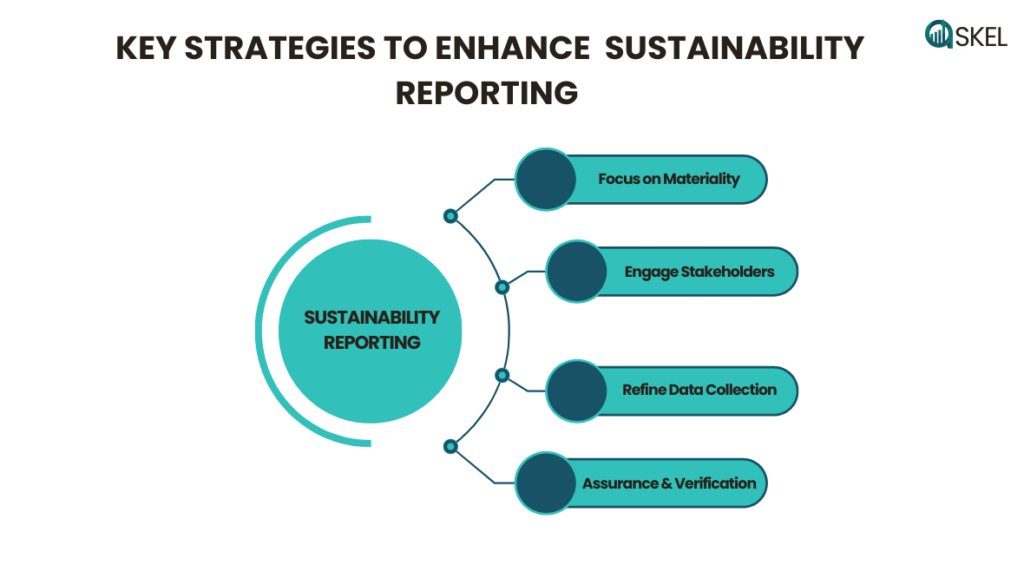How to Improve on Sustainability Reporting: A Guide

Learn about key strategies that can help enhance the sustainability reporting for your business.
As environmental concerns continue to escalate, stakeholders—including investors, customers, and regulators—demand greater transparency and accountability from businesses regarding their environmental impact. This heightened scrutiny underscores the necessity for businesses to consolidate and enhance their sustainability reporting practices over time. This involves streamlining communication channels, ensuring consistency in data presentation, and actively seeking to improve the depth and quality of information provided.
Effective sustainability reporting not only helps businesses track their environmental performance but also strengthens their reputation and competitive edge. By consistently improving reporting practices, companies can provide more accurate, comprehensive, and reliable data, which is crucial for building trust with stakeholders. Moreover, detailed sustainability reports can highlight areas of improvement, enabling businesses to implement more effective environmental strategies and achieve long-term sustainability goals.
In addition, regulatory frameworks and standards for sustainability reporting are continuously evolving. Businesses that stay ahead by refining their reporting practices can better navigate these changes, avoid potential compliance issues, and leverage new opportunities for growth. Enhanced reporting practices also facilitate better decision-making, as they provide valuable insights into the sustainability impacts of business operations.
This guide will equip you with the knowledge and 5 key strategies that businesses can adopt to enhance their sustainability reporting, ensuring they remain transparent, accountable, and ahead of the curve in their sustainability journey.
Focus on Materiality
Materiality in sustainability reporting refers to identifying and prioritising the environmental, social, and governance (ESG) issues that are most significant to a business and its stakeholders. This process ensures that the reported information is relevant, impactful, and aligned with the company’s strategic goals. Materiality is crucial because it helps businesses focus their resources on the most critical areas, enhances the relevance and credibility of their reports, and ensures that they address stakeholder concerns effectively.
To enhance materiality assessment practices, businesses can start by engaging with stakeholders to understand their concerns and expectations. Additionally, conducting a thorough analysis of industry trends and regulatory requirements can help identify emerging issues that may become material in the future.
Businesses can also use data-driven tools and frameworks, such as the Global Reporting Initiative (GRI) Standards, to systematically assess and prioritise ESG issues, and find implementation guidelines for materiality assessment. Regularly reviewing and updating the materiality assessment process ensures it remains dynamic and responsive to changing stakeholder priorities and external conditions.

Engage Stakeholders
Engaging stakeholders is fundamental to sustainability reporting because it ensures that the reporting process is inclusive and reflective of the concerns and expectations of those who have a vested interest in the business. Stakeholders can include employees, customers, investors, suppliers, community members, and regulatory bodies. Their input helps businesses identify and prioritise material issues, making the sustainability report more relevant and credible.
Businesses can enhance stakeholder engagement by adopting several strategies. First, they can establish regular communication channels, such as surveys, focus groups, and town hall meetings, to gather feedback and insights from various stakeholder groups. This ongoing dialogue ensures that stakeholders’ voices are heard and considered in the decision-making process.
Second, businesses can create stakeholder advisory panels or committees that provide continuous input and guidance on sustainability issues. Third, leveraging digital platforms and social media can help reach a broader audience and facilitate real-time engagement.
By actively involving stakeholders in the sustainability reporting process, businesses can ensure their reports are comprehensive, address key concerns, and reflect the true impact of their operations on society and the environment. This leads to more robust, transparent and meaningful sustainability reporting, ultimately enhancing the business’s reputation and stakeholder trust.
Refine Data Collection and Management Systems
Data collection and management systems refer to the systems used to gather, store, and analyse information related to a business’s sustainability performance. These systems are crucial for sustainability reporting as they provide the quantitative and qualitative data needed to assess and communicate a company’s environmental, social, and governance (ESG) impacts. Accurate and reliable data is essential for creating credible and transparent reports that stakeholders can trust.
Businesses can enhance their data collection and management systems by implementing a few key strategies. First, they can adopt advanced software solutions and tools that automate data collection processes, reducing the likelihood of human error and increasing efficiency.
Second, businesses should establish clear protocols and standards for data collection to ensure accuracy, consistency and comparability over time. Third, providing training for employees on data management best practices can help improve the quality and accuracy of the information gathered. By refining these systems, businesses can ensure that their sustainability reports are based on precise and comprehensive data, leading to more accurate and trustworthy reporting.
The business case for integrating sustainability into operations has been well documented over the last 15 years. However, it is only through transparent reporting and communicating about your sustainability work, performance and progress towards your goals that you can capture the value of sustainability. Without communication, how could you build reputation and trust? And how could you attract new capital or build competitive advantage if you did not communicate with stakeholders?
Small business big impact: SME sustainability reporting from vision to action, Global Reporting Initiative (GRI) and the International Organization of Employers (IOE).
Assurance and Verification
Assurance and verification in the context of sustainability reporting refer to the processes of reviewing and validating the accuracy and completeness of the reported data. Internal assurance involves an organisation’s own processes and controls to ensure data integrity. In contrast, third-party assurance involves an independent external party, often a sustainability expert or auditor, who evaluates and confirms the reliability of the sustainability information presented in the report.
Implementing assurance and verification, especially third-party verification, significantly enhances the credibility of a sustainability report. When an independent expert verifies the data, it demonstrates the company’s commitment to transparency and accountability. This external validation further reassures stakeholders, including investors, customers, and regulators, that the reported information is accurate and trustworthy.
Communicate Efforts and Achievements
Communicating efforts made towards achieving greater sustainability and achievements is crucial for demonstrating a company’s commitment to its ESG goals. By highlighting these efforts and achievements, a company can create value through enhanced brand reputation, increased customer loyalty, and potentially better financial performance due to a growing preference for sustainable businesses among stakeholders.
There are multiple ways a company can utilise information from a sustainability report to its advantage. For marketing, businesses can highlight key achievements and milestones in promotional materials, social media campaigns, and press releases, positioning themselves as leaders in sustainability.
Additionally, stakeholder engagement can be enhanced by sharing detailed progress reports during meetings, webinars, and through dedicated sustainability sections on the company website. A proactive communication approach not only reinforces trust but also encourages broader support for the company’s sustainability initiatives.


